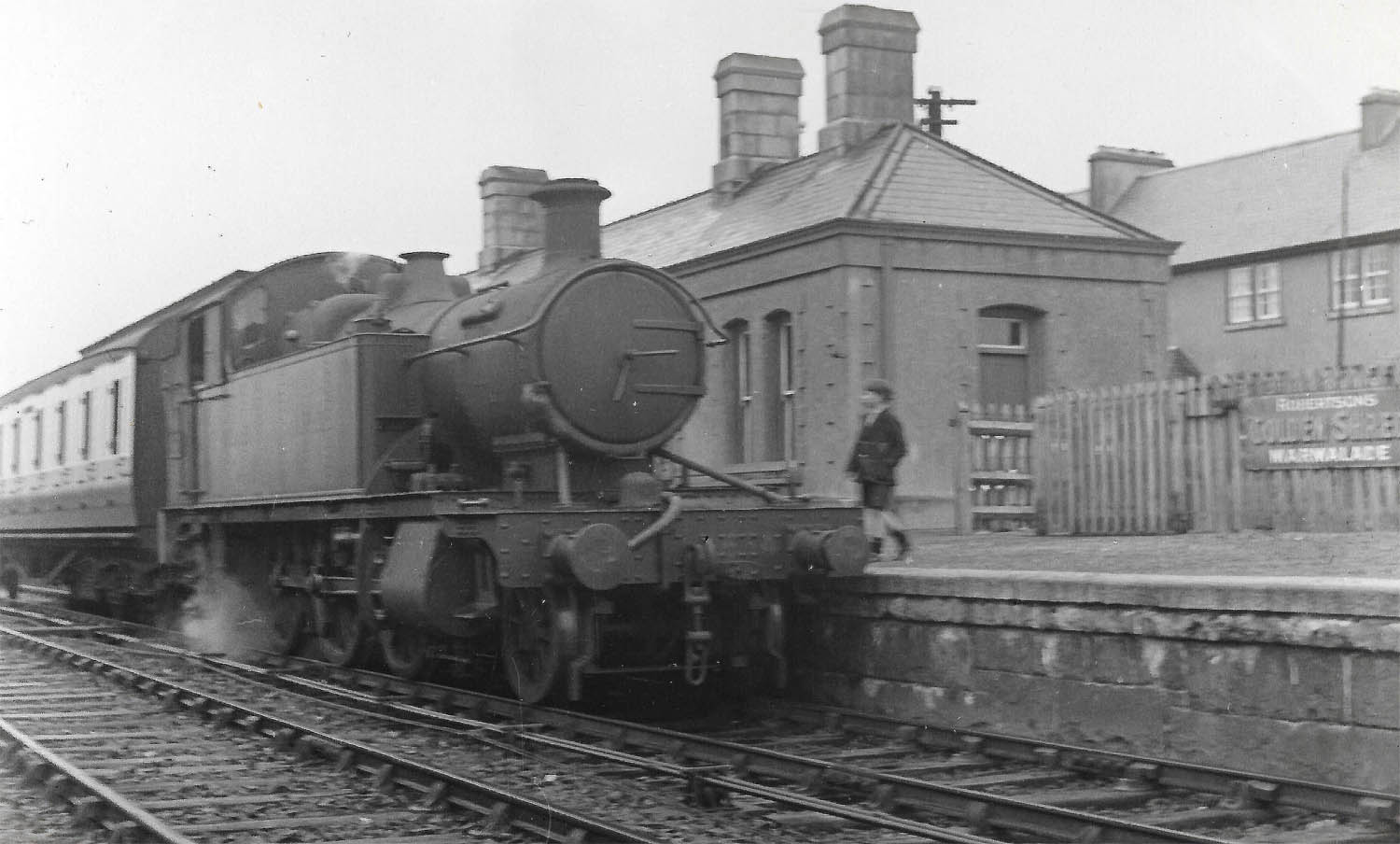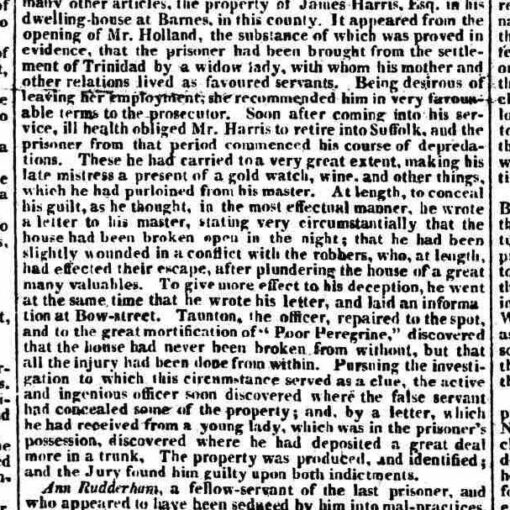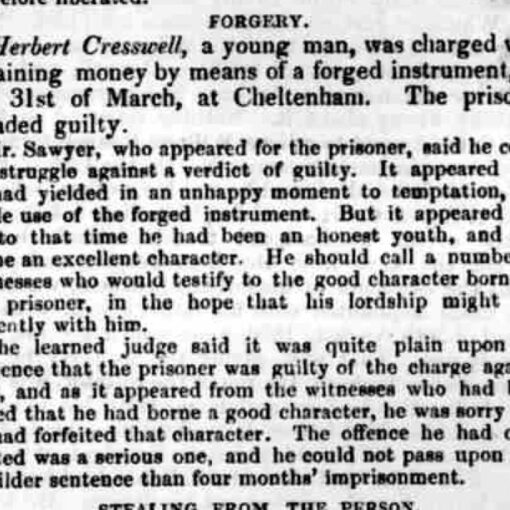Coventry Evening Telegraph – Wednesday 30 May 1945
Birmingham Trip in Stolen Motor Lorry
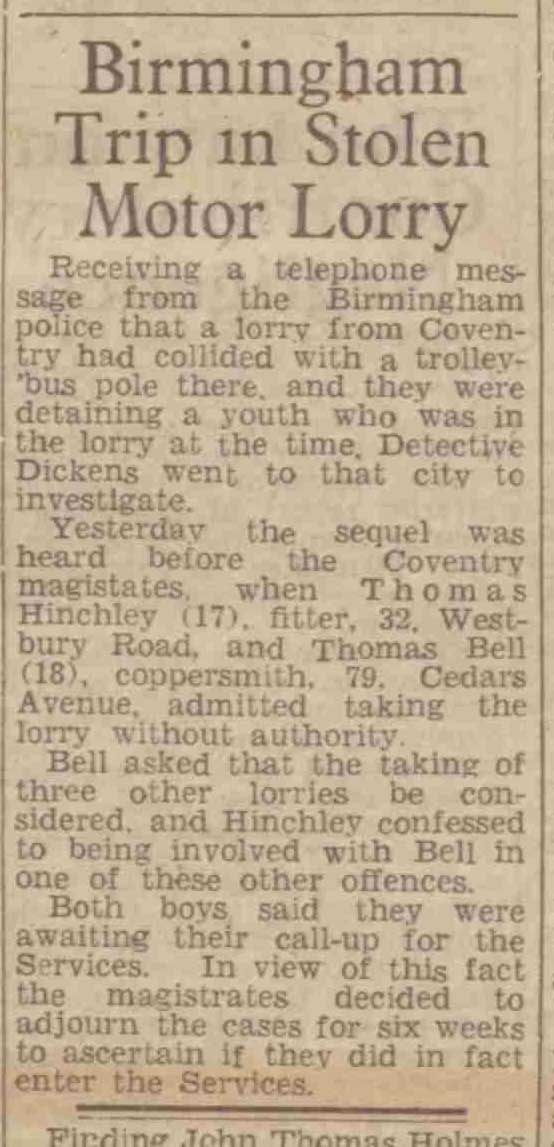
Receiving a telephone message from the Birmingham police that a lorry from Coventry had collided with a trolley-bus pole there, and they were detaining a youth who was in the lorry at the time, Detective Dickens went to that city to investigate.
Yesterday, the sequel was heard before the Coventry magistrates, when Thomas Hinchley (17), fitter, 32 Westbury Road, and Thomas Bell (18), coppersmith, 79 Cedars Avenue, admitted taking the lorry without authority.
Bell asked that the taking of three other lorries be considered, and Hinchley confessed to being involved with Bell in one of these other offences.
Both boys said they were awaiting their call-up for the Services. In view of this fact, the magistrates decided to adjourn the cases for six weeks to ascertain if they did in fact enter the Services.
Analysis
The Incident
The article reports on the actions of two Coventry youths, Thomas Hinchley and Thomas Bell, who were involved in taking a lorry without permission. Their misadventure resulted in a collision with a trolley-bus pole in Birmingham, which drew police attention. This brought Detective Dickens into the investigation and ultimately to the Coventry magistrates’ court.
The Law
In 1945, “taking a vehicle without authority” was a criminal offence in Britain under what is now referred to as “TWOC” (Taking Without Owner’s Consent). This was a relatively serious matter, though magistrates had discretion over how to handle youth offenders. The decision to adjourn the case for six weeks highlights the flexibility of the judicial system when dealing with individuals about to enter military or national service.
Life in 1945
- Youth and National Service: Both young men were awaiting conscription into the armed forces, as the Second World War was coming to an end (the war in Europe had concluded just weeks earlier). Their imminent call-up would have weighed heavily on their lives, and the magistrates’ leniency reflects a societal consideration for those contributing to the war effort.
- Social Context: In the aftermath of the war, there was a sense of upheaval and adjustment. Many young men were transitioning from adolescence to adulthood amidst the challenges of military service and post-war reconstruction. Delinquency was not uncommon, as young people sought to navigate this challenging period.
- Transport and Vehicles: The mention of a trolley-bus highlights the public transportation infrastructure of the time. Stolen lorries, as well as other vehicles, could disrupt both public and private services, making such cases significant to local authorities.
For Genealogists
- The names, occupations, and addresses of the individuals involved are of particular value to genealogists. For example:
- Thomas Hinchley: Fitter, 32 Westbury Road
- Thomas Bell: Coppersmith, 79 Cedars Avenue
- These details can provide insight into where these individuals lived, their occupations, and even potential family connections in Coventry.
For Historians
- Judicial Practices: The adjournment of the case due to the boys’ military service obligations sheds light on the judicial system’s approach to youth crime and its connection to wartime priorities.
- Post-War Youth: The incident offers a snapshot of youth culture and behaviour at a time when traditional structures of authority were being renegotiated after years of war.
- Transportation: The reference to a trolley-bus accident and the use of a lorry provides details about post-war urban transport and the types of vehicles in use.
The Bigger Picture
This small, local incident illustrates broader societal dynamics of the time:
- The strain of war on communities and individuals, especially the youth.
- The interaction between urban and rural areas, as seen in the journey between Coventry and Birmingham.
- The role of local newspapers like the Coventry Evening Telegraph in documenting everyday life and maintaining community connections.
Use for Old British News
- Research Projects: This article could serve as a primary source for researchers studying post-war British society, particularly in Midlands cities.
- Educational Purposes: It provides an accessible example of how local media covered crime, youth, and judicial proceedings in the 1940s.
- Community History: For Coventry and Birmingham residents, it offers a glimpse into historical events involving their cities, potentially enriching local heritage projects.
This story is an example of how seemingly minor incidents in newspapers of the time can reveal much about broader social, legal, and historical contexts.
The Coventry Evening Telegraph
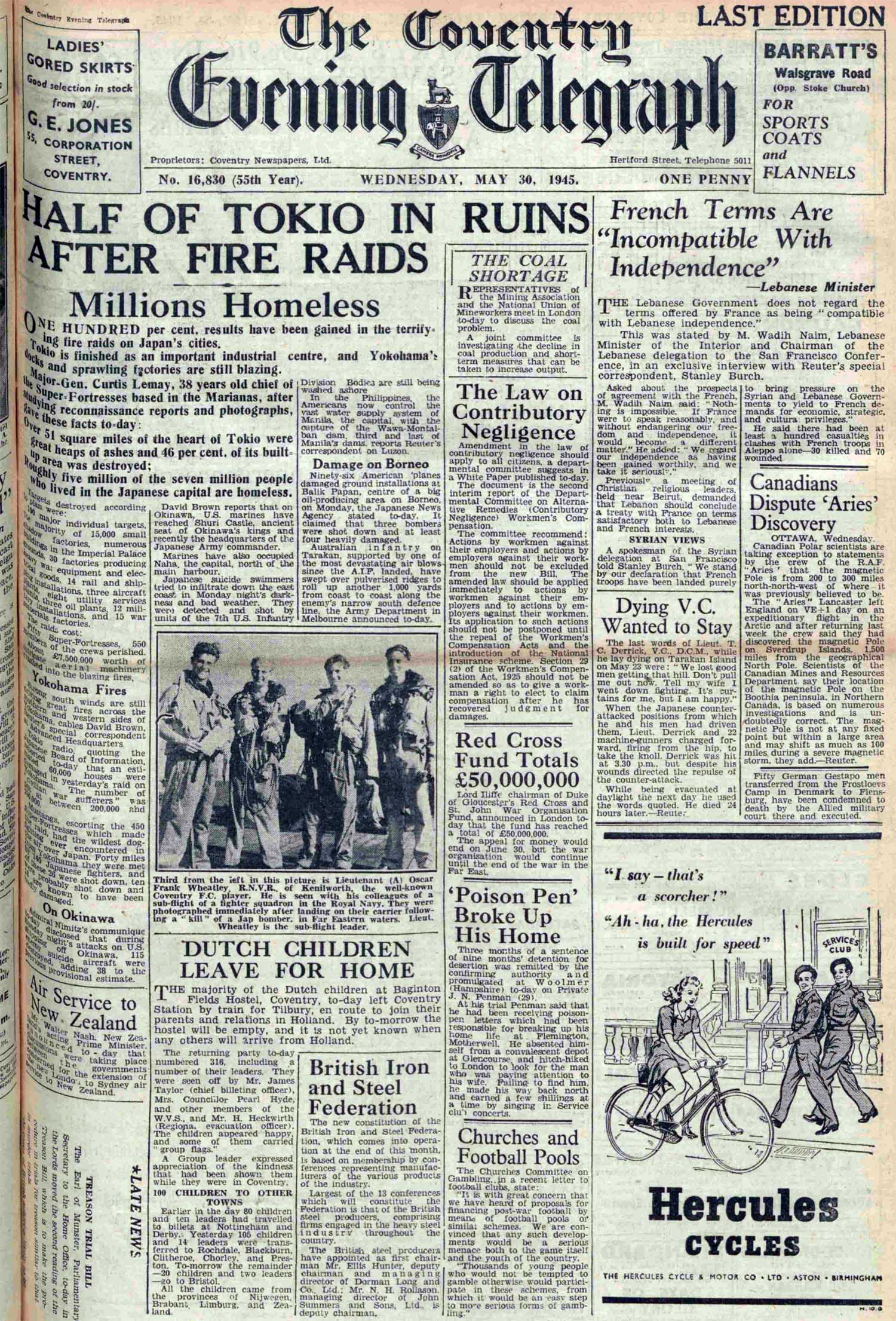
The Coventry Evening Telegraph was established in Coventry on 9 February 1891 by William Isaac Iliffe, in partnership with Henry Sturmey. Iliffe was already the proprietor of the weekly Coventry Times. It was the city’s first daily newspaper and was initially published under the title Midland Daily Telegraph. The publication, a four-page broadsheet, was priced at half a penny. By the end of its first year, four editions were being printed daily, although it took many years before the paper became financially viable.
In their inaugural statement, the proprietors declared that the Telegraph would “advocate those high principles of Independent Liberalism which form the broad basis of the freedom and liberty of the people.” They pledged it would be political without aligning with any party or faction and that it would report on all public events impartially. They assured readers that “the sheet will be bright and chatty” and expressed their ambition to win public support by “including special features never before introduced into daily journalism in the Midlands.” The paper covered local, national, and international news alongside commercial and financial reports and sports coverage. In 1897, a pink sports edition was introduced on Saturday evenings, and a khaki edition was later published to honour soldiers returning from the Boer War.
The Midland Daily Telegraph became an evening newspaper in 1941, adopting the name Coventry Evening Telegraph. It continued to grow in popularity and circulation over the following decades. In 2006, it was rebranded as the Coventry Telegraph.
Birmingham Trip in Stolen Motor Lorry: Coventry Youths Await Court Verdict – 1945 Hashtag: #1940sCrime #CoventryHistory #PostWarUK #OldBritishNews #1945

